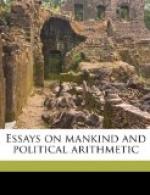The greatness of Rome gave Carthage very anxious thoughts, and it rather seems that they entered into the second Punic War more for fear the Romans should have the universal empire, than out of any ambition to lord it themselves over the whole world. Their design was virtuous, and peradventure wise to endeavour at some early interruption to a rival that grew so fast. However, we see they miscarried, though their armies were led by Hannibal. But fortune which had determined the dominion of the earth for Rome, did, perhaps, lead them into the fatal counsel of passing the Eber contrary to the articles of peace concluded with Asdrubal, and of attacking Saguntum before they had sufficiently recovered of the wounds they had suffered in the wars about Sicily, Sardinia, and with their own rebels. If the high courage of Hannibal had not driven the commonwealth into a new war while it was yet faint and weak, and if they had been suffered to pursue their victories in Spain, and to get firm footing in that rich, warlike, and then populous country, very probably in a few years they might have been a more equal match for the Roman people. It is true, if the Romans had endeavoured, at the conquest of Spain, and if they had disturbed the Carthaginians in that country, the war must have been unavoidable, because it was evident in that age, and will be apparent in the times we live in, that whatever foreign power, already grown great, can add to its dominion the possession of Spain, will stand fair for universal empire.
But unless some such cogent reason of state, as is here instanced, intervene, in all appearance the best way for a nation that apprehends the growing power of any neighbour is to fortify itself within; we do not mean by land armies, which rather debilitate than strengthen a country, but by potent navies, by thrift in the public treasure, care of the people’s trade, and all the other honest and useful arts of peace.
By such an improvement of our native strength, agreeable to the laws and to the temper of a free nation, England without doubt may be brought to so good a posture and condition of defending itself, as not to apprehend any neighbour jealous of its strength or envious of its greatness.
And to this end we open these schemes, that a wise Government under which we live, not having any designs to become arbitrary, may see what materials they have to work upon, and how far our native wealth is able to second their good intentions of preserving us a rich and a free people.
Having said something of the number of our inhabitants, we shall proceed to discourse of their different degrees and ranks, and to examine who are a burden and who are a profit to the public, for by how much every part and member of the commonwealth can be made useful to the whole, by so much a nation will be more and more a gainer in this balance of trade which we are to treat of.
Mr. King, from the assessments on births and marriages, and from the polls, has formed the scheme here inserted, of the ranks, degrees, titles and qualifications of the people. He has done it so judiciously, and upon such grounds, that is well worth the careful perusal of any curious person, from thence we shall make some observations in order to put our present matter in a clearer light.




